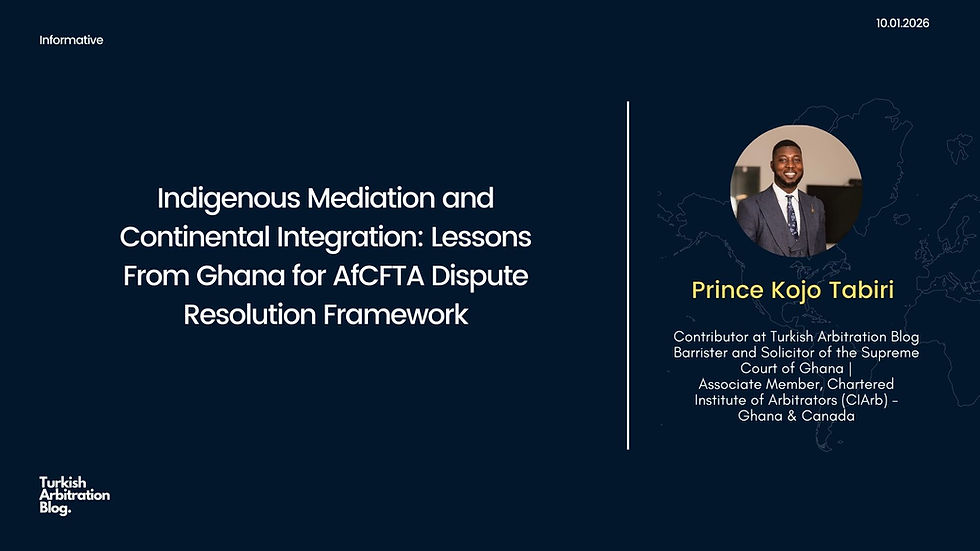The Default Clause/s of FOSFA, Gafta and Other London Commodity Trade Associations’ Similar Clauses - The Toprak Case and Inapplicability of Common Law Principles.
- arbitrationblog
- Aug 14, 2025
- 4 min read

As commonly called in London commodity trade associations, the Toprak case (Toprak Mahsulleri Ofisi vs Finagrain Compagnie Commerciale Agricole Et Financiere S.A. [1979] 2 Lloyd's Rep. 98 Court of Appeal) , establishes what the words default of fulfilment and thereby the words ‘’date of default’’ of these clauses mean.
This a non-common law but purely contractual concept. It is of capital importance, as the damages for breach of condition are assessed vis-à-vis the market level on the date of default, unless there has been a bona fide cover or resell against the defaulter (on the date of default or at a reasonable time, thereafter, as found by the arbitrators).
Thus, it is fair to say that everything about damages revolves around the date of default. Consequently, as it will be shown below, a realm of common law concepts becomes inapplicable once this date is found or it is modified, in accordance with the guidelines of Toprak.
To better understand the rationale of the Default Clause/s or Toprak, I say to my colleagues: ‘’forget the word default, concentrate on the word date’’.
At page 98 of the Report, the Court of Appeal defined the date of default as ‘’when the time for performance came and went without performance’’.
Thus, if a port had to be nominated by January 4 or an LC to be provided by February 5 and the duty was not complied with, these are then the dates of default. There is, however, an argument that the date of default is the next business day when the innocent party, if it wished, could have gone to the market to cover or resell in accordance with the alternative offered by the Default Clause Bremer Handelsgesellschaft G.M.B.H. V. Vanden Avenne-Izegem P.V.B.A.[1977] 2 Lloyd's Rep 329. It is sound strategy therefore to provide evidence for two dates, alternatively, at arbitration.
According to Toprak, once the date of default is established, it can be modified but this requires a bilateral element; it is obvious that once a contractual date is found, it cannot be changed unilaterally! A modification of the date of default requires either indulgence of the innocent party for the defaulter to perform at a later stage and reliance thereon by the defaulter, in which case if it defaults again the date will change, or an offer to perform at a later stage made by the defaulter and its acceptance by the innocent party.
Insofar as, as mentioned above, the date of default governs everything about damages, the following common law concepts become inapplicable or devoid of any sense.
1. Termination of contract does not occur in its proper sense, as it is not further to the termination notice of the innocent party that the damages are calculated but ’already’ when the time for performance came and went without performance. In this respect, according to Toprak, the timing selected by the innocent party for sending a notice of default is irrelevant for the establishment of the date of default.
2. Affirmation of contract cannot take place as a unilateral act (of affirmation of contract) cannot change the date of default.
3. After a default, a Rickards v Oppenheim notice for making time of the essence has no effect as the position cannot change unilaterally.
4. For the same reason the Court of Appeal informed in Toprak at page 109 of the Report that there cannot be any waiver or an estoppel after the date of the default in the following terms: « …there is no variation of the terms of the contract, nor is there any waiver nor estoppel ».
5. Also, in contradiction with the sacrosanct common law principle according to which an anticipatory or repudiatory breach is sword in water unless it is accepted by the innocent party as final breach, it was held in 2011, applying Toprak, that such breaches are defaults under the Gafta Default Clause (and thereby the similar. Default Clauses) ‘without’ any acceptance, thereby fixing the date of default Thai Maparn Trading Co Ltd v Louis Dreyfus Commodities Asia Pte Ltd [2011] EWHC 2494 (Comm).
An in-depth analysis of the Default Clause/s can be found in my article published under the heading: The ‘’Date of default” Concept of the FOSFA and GAFTA Agribusiness Standard Form Contracts as Basis for Examining the Consequences of a Repudiatory Breach, published by the Swiss Arbitration Assoc. Bulletin, 39, 1 (2021) pp.79 -82
About the Author
Jacques Covo is a Legal Advisor to commodity trading companies and a consultant to law firms worldwide in matters of commodity arbitrations. He is a former member of the FOSFA & GAFTA Contracts Committees and Appeal (Arbitration) Boards. His expertise spans soft commodities, trading, dry shipping, and international trade, representing traders across the globe. He also serves as an ICC Arbitrator (Swiss Panel).
Born in Istanbul, Mr. Covo earned his college diploma from “Özel Sen Benua Fransız Lisesi” and holds an LL.M. from the University of Geneva, as well as the I.E.C.G. Diploma from the “Institut d’Etudes Commerciales” of the Law Faculty of the University of Grenoble, France. During his legal training with a law firm in Montreal, Canada, he obtained a Postgraduate Certificate in Arbitration and Comparative Law from McGill University.
He began his career as an in-house lawyer in Geneva at Finagrain S.A., an affiliate of Continental Grain Company (New York), where he managed the Arbitration Department for 12 years before founding his own arbitration-based practice in Geneva.




Comments